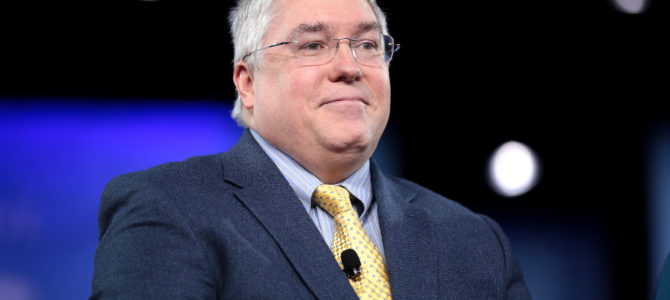
It’s a remarkable quirk of our federal republic that U.S. policy often hinges on local races. Regional personalities and issues, emerging from places coastal elites have never visited, will play a significant role in next year’s midterm elections—most crucially, the battle for the U.S. Senate.
At stake is not just which party controls the upper chamber—the rough number of blues versus reds—but how faithful senators will be to their governing philosophies. As the dust settles from 2018, will Washington be more conservative? More liberal? More functional? Local politics will determine many of these answers.
In tiny Harpers Ferry, West Virginia, around 100 local Republicans recently gathered for one small episode in that larger drama. Most people arrived from work, still in business attire, but a few were more expressively dressed: T-shirts emblazoned with “Don’t Tread on Me” or “West Virginia Citizens Defense League.” As volunteers scrambled to bring in additional chairs, and the air conditioning struggled to keep the temperature comfortable, West Virginia attorney general Patrick Morrisey entered the room. Attendees held signs declaring the reason for the gathering: “Patrick Morrisey for U.S. Senate.”
It was the official kickoff for a campaign that has long been expected in West Virginia. Incumbent Sen. Joe Manchin, one of the few remaining moderate Democrats in the upper house, is widely viewed as vulnerable in the 2018 election. While Manchin walks a tightrope in a state that grows more Republican every year, he has often angered both West Virginians on the one side, and national Democrats on the other. He’s even drawn enough ire to attract a long-shot primary opponent to his Left.
On the GOP side, the field for Manchin’s seat is even more crowded. While Politico reports that national GOP recruitment for the Senate is “slow-going,” West Virginia—the reddest state on the electoral map last year—appears to be the exception. Donald Trump won every county here in 2016, trouncing Hillary Clinton by a 42-point margin. Trump is such a dominant figure on West Virginia’s political landscape that the newly elected Democrat governor put his finger in the wind and announced he was switching parties.
In this promising climate, three Republicans to date have cast their hats into the ring: Morrisey, Rep. Evan Jenkins, and Bo Copley, a political newcomer.
A Record of Fighting Hard Battles
Of these three, only Morrisey has been elected statewide. He first won the attorney general spot in 2012, then was reelected last year. His initial run was something of a David-and-Goliath story: not only was he the first Republican elected attorney general since 1933, he also unseated a 20-year incumbent.
Morrisey didn’t hesitate to remind the crowd in Harpers Ferry of that upset win, or to highlight his record of fighting and winning tough battles as attorney general. Besides working to reform the AG’s office and tackle state issues like Internet access, prescription drug abuse, and disability fraud, Morrisey also made West Virginia a thorn in the Obama administration’s side.
Embracing the principle that states are the first line of defense against the abuse of federal power, Morrisey’s office led multiple court challenges against federal overreaches that would have harmed West Virginia. His most notable win was a 5-4 Supreme Court ruling to halt the Environmental Protection Agency’s implementation of its Clean Power Plan—a plan Morrisey said “was intended to be the death knell for coal.”
“While other politicians talked about all they were doing for coal miners,” he told the crowd, “we went to court. We wrote the briefs, we built a massive coalition, including 27 states and 150 parties, and we took on the powerful Obama EPA – and we won. More families are working today because we took on that fight for West Virginia.” As chairman of the Republican Attorneys General Association, Morrisey also led successful coalition fights against Obama’s unlawful immigration plan, his transgender bathroom directive to public schools, and the EPA’s onerous “waters of the United States” rule.
Can Manchin Be Defeated?
Morrisey emphasizes his record not only as a measure of his conservative bona fides. He’s also sending a signal to West Virginia Republicans that he, not his primary opponents, has what it takes to defeat Manchin.
No matter how red West Virginia may appear on a presidential map, any campaign against Manchin will be a daunting task. The senator continues to enjoy approval numbers in the mid-50s and has amassed a war chest of nearly $3.5 million. As a former two-term governor, he’s been a political juggernaut in this state, which is known for its fondness of incumbents. Manchin occupies the seat once held by Robert Byrd, who died in office at age 92, the longest-serving U.S. senator in history. Byrd’s election in 1958 was the last time West Virginia voted out a sitting U.S. senator.
Still, as West Virginia trends increasingly conservative, and Manchin’s time spent in DC has pushed him further left, the gap between the senator and folks back home has widened. The issue of gun rights affords the clearest example. When Manchin first ran for the remainder of Byrd’s term in 2010, the National Rifle Association endorsed him for Senate, citing the A rating he’d earned as governor. Manchin’s most talked-about TV ad from the 2010 election not only trumpeted the NRA endorsement, it featured the candidate loading a rifle and shooting a copy of federal cap-and-trade legislation.
Since arriving in DC, however, Manchin has been leading Democrats’ gun control efforts in the wake of tragic shootings in Newtown, Connecticut, and Orlando, Florida. After Newtown, Manchin called for universal background checks and introduced a version of background check expansion, saying that although his bill could not have prevented the Newtown tragedy, the alternative was “to sit here and do nothing.”
After Orlando, he advocated and voted for legislation that would have stripped Americans who land on a federal watchlist of their Second Amendment rights, without due process. Last year, during an appearance on MSNBC to advocate for this legislation, Manchin said that when it comes to guns, “due process is what’s killing us right now.” This comment was slammed by civil libertarians and conservatives, including Manchin’s former ally, the NRA.
In his candidacy announcement last week, Morrisey didn’t fail to bring up Manchin’s Freudian slip lamenting constitutional due process. “Think about that,” Morrisey said. “A constitutional guarantee is ‘killing us’ when it comes to guns. We can do better.”
Morrisey also criticized Manchin’s uncertain stance on Obamacare: “First he was for it, then he was against it, now I guess he’s for it again—even though private sector premiums are skyrocketing and families in West Virginia are hurting. We must repeal Obamacare!” It was one of the biggest applause lines of the day.
But First: A Primary Challenge
Before Morrisey can go toe-to-toe with Manchin, however, he must first get through a tough and potentially damaging primary. Rep. Evan Jenkins was the first to declare his candidacy for the race back in May, and his announcement video—featuring a pickup truck, a soothing West Virginia drawl, and the frequent use of the word “conservative”—are reminiscent of Manchin’s campaign style.
Indeed, Jenkins was once a political ally and campaign donor of Manchin’s. He switched his party registration from Republican to Democrat in 1992 to run for the state legislature, serving as a Democrat legislator for the better part of two decades (including during Manchin’s term as governor). He then became a Republican again to run for Congress in 2013.
As a congressman, he’s earned a 56 percent score from the Heritage Foundation and 61 percent from the American Conservative Union. He recently defended Republican Sen. Shelley Moore Capito’s decision to vote against a clean repeal of Obamacare. Although their parties are currently different, it appears that Jenkins and Manchin share a generally centrist philosophy.
By contrast, Morrisey doesn’t fit the West Virginia political mold. A reliable conservative on the issues, he would represent a clear break from the status quo in a state where many politicians shift with the winds. “You may not always agree with everything I say,” he said in his announcement speech, “but one thing you will know: my convictions are not poll-tested. They are deep to the bone.”
His manner is intense and energetic, and his speech lacks the homey twang of a native (Morrisey grew up in New Jersey and moved here in 2006). As an attorney who once worked on Capitol Hill, Jenkins is already portraying Morrisey as a soulless lobbyist and DC insider.
Morrisey’s task will be to convince West Virginians that he—not centrist hometown politicians—has the proven record of actually fighting for their interests. In a state that has consistently lagged behind and has felt increasingly under attack from the national Democrat Party, West Virginians are looking for someone to fight for them. It’s why President Trump is so popular here, and why past support for national Democrat politicians may come back to haunt Manchin and Jenkins.
“Many West Virginians are struggling for economic opportunities,” Morrisey told supporters at his announcement rally. “Yet the elites don’t want to confront that hard truth, and they keep pushing policies that pick winners and losers. In the process, they leave many Americans and West Virginians behind.” Then, to loud applause: “But I’m one who likes to take on the forces of the status quo and win.”









